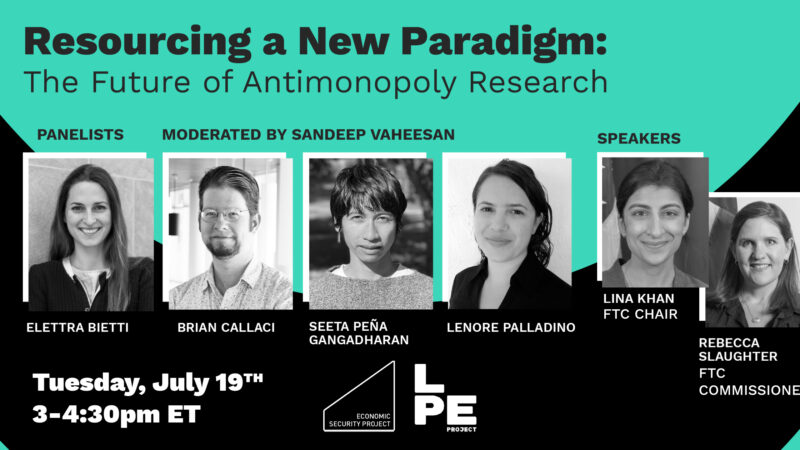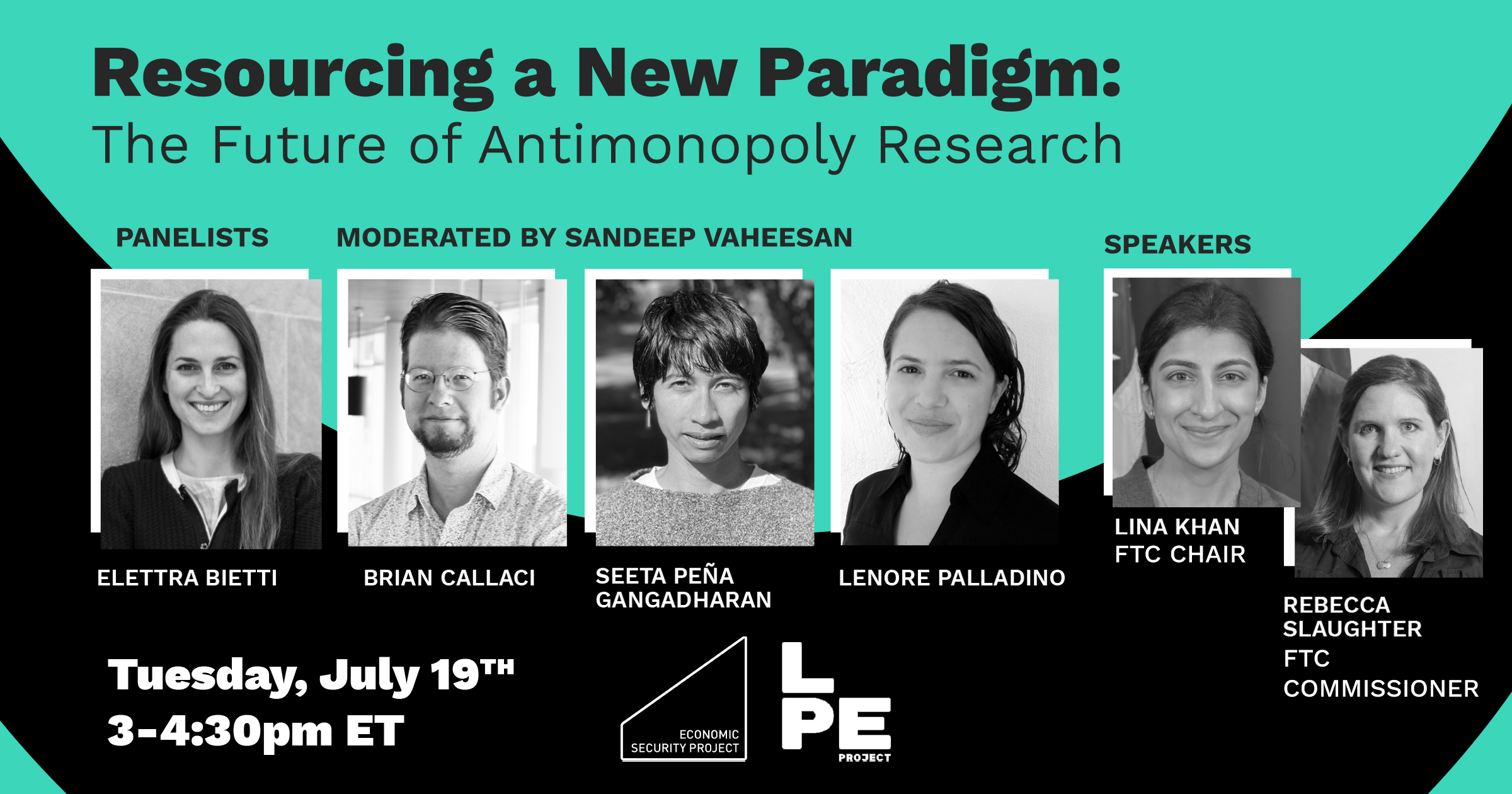Event
Event Highlights: Antimonopoly Research Has Grown and Continues to Challenge Conventional Economic Paradigms
07. 21. 2022
Government Officials, Academics and Advocates Discuss Research Impact on Centering Power in Policy and Enforcement

Washington, D.C. — On Tuesday, July 19, Economic Security Project (ESP) and the Law and Political Economy Project (LPE) brought together leading scholars, advocates, and government officials to discuss how research is reframing economic paradigms and the importance of challenging monopolies.
“The moment that we’re in is a real testament to the power of research and scholarship, in particular, to lead not just to a paradigm shift in thought, but also in practice,” said Federal Trade Commission Chair Lina Khan. ”All things considered, we are still fairly early in the implementation and execution phase, but think the antimonopoly research and scholarship that communities like LPE and ESP have produced and cultivated has laid out a very, very solid foundation.” [See video clip here]
The full recording of the webinar, Resourcing a New Paradigm: The Future of Antimonopoly Research, is available here: economicsecproj.org/antimonopoly-research
Experts highlighted the multitude of ways in which antimonopoly research has already guided antimonopoly enforcement, focusing on examples of how it has challenged systemic racism and improved market competition:
“There’s no better time for antimonopoly scholarship,” said Becky Chao, Director of Antimonopoly at the Economic Security Project. “The moment we’re in demands deep, critical inquiry into the structure of the economy — who it works for, who it’s stacked against, and who writes the rules — as well as creative, innovative insights and solutions to build a more equitable, democratic, resilient, and sustainable economy. Antimonopoly research, which gets at the heart of how we structure markets, is core to this interdisciplinary project,” [See video clip here]
“Antitrust law and antimonopoly thinking are really critical to, one, begin to sort of map and understand how various kinds of law, not just antitrust, but also, as will hear a little bit about today, corporate law, intellectual property law, law of franchising, law of government, data —all of that. How has law been constructed to help concentrate corporate and private power and contribute to monopoly power, but also to disable certain kinds of, or make more difficult, certain kinds of democratic governance of our economy,” said Amy Kapczynski, Professor of Law and Faculty Director, Global Health Justice Partnership. [See video clip here]
“We need to think strategically about using antitrust law and competition policy as a tool for combating structural racism. In a system built on a social construct that favors incumbents, we need to be asking how we can use our enforcement tools to ensure that markets are competitive and empower historically underrepresented and economically disadvantaged consumers rather than incumbents. To protect consumers and effectively promote competition with lasting impact, we need to address the underlying problems in the system. We need to be actively anti-racist” said FTC Commissioner Rebecca Kelly Slaughter. [See video clip here]
“I think we are mistaken when we say that antimonopoly is primarily about fighting big business and that it’s anti-bigness. And that’s because distributing power and authority or socially controlling business doesn’t necessarily imply the fighting, or the outlawing of concentrated or centralized productive functions in an economy. Instead, anti monopoly could mean regulating and publicizing concentrated private power. It is a dynamic umbrella of approaches that span across law and beyond, for making markets, infrastructures and emerging industries more responsive to the needs of society,” said Elettra Bietti, NYU School of Law and the Digital Life Initiative at Cornell Tech in New York Joint Postdoctoral Fellow. [See video clip here]
“Antimonopoly can’t just focus on correcting distortions to sort of nudge economies back to this ideal of a blackboard, a perfect competition model. We actually have to have ongoing active policies to structure and regulate our markets and businesses to make sure they’re fulfilling all those socially beneficial functions that we want them to do” said Brian Callaci, Open Markets Institute Chief Economist. [See video clip here]
“I think that doing work to reduce corporate power is important, because what we actually need is a productive and democratic economy that supports real innovation to meet our needs and not elite extraction,” said Lenore Palladino, University of Massachusetts Amherst Assistant Professor of Economics and Public Policy. [See video clip here]
“I’m, hoping that, partly in this conversation and in future conversations, we’re able to really affirmatively identify what is the thing that we’re working towards, so it’s not a negative thing “anti,” but actually thinking in imaginative ways about the ways, the ways that we participate in these debates, and impact,” said Seeta Peña Gangadharan, London School of Economics and Political Science Associate Professor in the Department of Media and Communications. [See video clip here]
If you would like a rough transcript of the webinar then please email [email protected].
Speakers:
- Lina Khan, Federal Trade Commission Chair
- Rebecca Kelly Slaughter, Federal Trade Commission Commissioner
- Elettra Bietti, NYU School of Law and the Digital Life Initiative at Cornell Tech in New York Joint Postdoctoral Fellow
- Brian Callaci, Open Markets Institute Chief Economist
- Seeta Peña Gangadharan, London School of Economics and Political Science Associate Professor in the Department of Media and Communications
- Lenore Palladino, University of Massachusetts Amherst Assistant Professor of Economics and Public Policy
- Becky Chao, Economic Security Project, Director of Antimonopoly
- Amy Kapczynski, Professor of Law and Faculty Director, Global Health Justice Partnership
- Moderated by Sandeep Vaheesan, Open Markets Institute Legal Director
